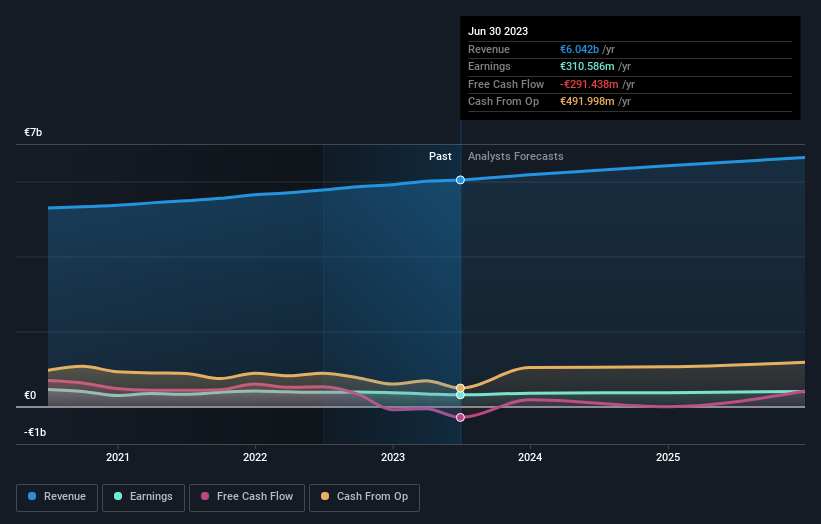Owning 53% in United Internet AG (ETR:UTDI) means that insiders are heavily invested in the company's future
Key Insights
Insiders appear to have a vested interest in United Internet's growth, as seen by their sizeable ownership
53% of the company is held by a single shareholder (Ralph Dommermuth)
A look at the shareholders of United Internet AG (ETR:UTDI) can tell us which group is most powerful. The group holding the most number of shares in the company, around 53% to be precise, is individual insiders. In other words, the group stands to gain the most (or lose the most) from their investment into the company.
So, insiders of United Internet have a lot at stake and every decision they make on the company’s future is important to them from a financial point of view.
In the chart below, we zoom in on the different ownership groups of United Internet.
View our latest analysis for United Internet
What Does The Institutional Ownership Tell Us About United Internet?
Many institutions measure their performance against an index that approximates the local market. So they usually pay more attention to companies that are included in major indices.
As you can see, institutional investors have a fair amount of stake in United Internet. This implies the analysts working for those institutions have looked at the stock and they like it. But just like anyone else, they could be wrong. When multiple institutions own a stock, there's always a risk that they are in a 'crowded trade'. When such a trade goes wrong, multiple parties may compete to sell stock fast. This risk is higher in a company without a history of growth. You can see United Internet's historic earnings and revenue below, but keep in mind there's always more to the story.
Hedge funds don't have many shares in United Internet. The company's CEO Ralph Dommermuth is the largest shareholder with 53% of shares outstanding. This essentially means that they have significant control over the outcome or future of the company, which is why insider ownership is usually looked upon favourably by prospective buyers. The second and third largest shareholders are Allianz Asset Management GmbH and Wellington Management Group LLP, with an equal amount of shares to their name at 3.4%.
While it makes sense to study institutional ownership data for a company, it also makes sense to study analyst sentiments to know which way the wind is blowing. There are a reasonable number of analysts covering the stock, so it might be useful to find out their aggregate view on the future.
Insider Ownership Of United Internet
While the precise definition of an insider can be subjective, almost everyone considers board members to be insiders. Company management run the business, but the CEO will answer to the board, even if he or she is a member of it.
Insider ownership is positive when it signals leadership are thinking like the true owners of the company. However, high insider ownership can also give immense power to a small group within the company. This can be negative in some circumstances.
Our information suggests that insiders own more than half of United Internet AG. This gives them effective control of the company. That means insiders have a very meaningful €1.9b stake in this €3.5b business. Most would argue this is a positive, showing strong alignment with shareholders. You can click here to see if they have been selling down their stake.
General Public Ownership
The general public-- including retail investors -- own 22% stake in the company, and hence can't easily be ignored. While this group can't necessarily call the shots, it can certainly have a real influence on how the company is run.
Next Steps:
I find it very interesting to look at who exactly owns a company. But to truly gain insight, we need to consider other information, too. To that end, you should be aware of the 3 warning signs we've spotted with United Internet .
Ultimately the future is most important. You can access this free report on analyst forecasts for the company.
NB: Figures in this article are calculated using data from the last twelve months, which refer to the 12-month period ending on the last date of the month the financial statement is dated. This may not be consistent with full year annual report figures.
Have feedback on this article? Concerned about the content? Get in touch with us directly. Alternatively, email editorial-team (at) simplywallst.com.
This article by Simply Wall St is general in nature. We provide commentary based on historical data and analyst forecasts only using an unbiased methodology and our articles are not intended to be financial advice. It does not constitute a recommendation to buy or sell any stock, and does not take account of your objectives, or your financial situation. We aim to bring you long-term focused analysis driven by fundamental data. Note that our analysis may not factor in the latest price-sensitive company announcements or qualitative material. Simply Wall St has no position in any stocks mentioned.


